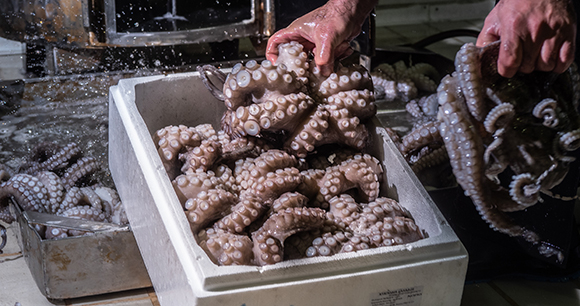
Senate
OCTOPUS Act (S. 1947)
Sponsored by Senators Sheldon Whitehouse (D-RI) and Lisa Murkowski (R-AK)
Octopuses are well-known for their intelligence, curiosity, and creativity—they are famous for escaping their cages in aquariums, poaching fish from nearby exhibits, and playfully sabotaging exhibit fixtures. A recent review of over 300 scientific studies of octopus and other cephalopods also found strong evidence that octopuses are sentient, meaning they are capable of experiencing feelings such as pain, pleasure, distress, and excitement.
Given this, the review’s authors concluded with “very high confidence ... that high-welfare commercial farming of cephalopods is currently impossible.” Because octopuses are such cognitively complex animals, they require complex environments for mental stimulation. They are also territorial and are known to react poorly when kept in captivity with other octopuses, leading to cannibalism or even self-cannibalism in reaction to the stress. In an enclosed setting, octopuses’ soft bodies and skin are also easily injured when they jet away from objects to escape perceived threats. Finally, there is no known method to humanely slaughter octopuses on a large, commercially viable scale.
Octopuses are not currently farmed for human consumption on a commercial scale in the United States. However, a planned facility in Spain has been awaiting environmental permits since 2021 and expects to begin construction soon. The facility, run by a company called Nueva Pescanova, would produce 3,000 tons of octopus meat annually, requiring the slaughter of about 1 million octopuses. Nueva Pescanova claims that farming would reduce the need for wild-caught octopus, but it is more likely that a supply of farmed octopus would only increase global demand and lower market prices. In addition, octopuses are obligate carnivores, which means that octopus farming would increase pressure on already-overfished fishmeal species, especially in the Global South.
The Opposing the Cultivation and Trade of Octopus Produced through Unethical Strategies (OCTOPUS) Act would ban commercial octopus farming in the United States and prohibit imports of farmed octopus from foreign countries. More specifically, the bill would do the following:
- Prohibit commercial octopus aquaculture operations in the United States
- Prohibit the import of commercially farmed octopus or products containing commercially farmed octopus and impose fines for violations
- Require importers to certify that they are not importing farmed octopus
- Exempt octopuses destined for zoos, aquariums, universities, or federal agency facilities from these requirements
- Require NOAA to collect data on octopus harvest methods in trade programs under its jurisdiction
The OCTOPUS Act would proactively protect octopuses from inhumane farming conditions and establish the United States as a global leader in animal welfare and environmental protection. The bill is endorsed by the following organizations: Animal Legal Defense Fund, Animal Rights Initiative, Animal Welfare Institute, Association of Zoos and Aquariums, Born Free USA, Compassion in World Farming, Compassionate Action for Animals, Don’t Cage Our Oceans, Endangered Species Coalition, Environmental Investigation Agency, Farm Sanctuary, Food & Water Watch, Friends of the Earth, Global Federation of Animal Sanctuaries, Humane World Action Fund, Humane World for Animals, Inland Ocean Coalition, International Fund for Animal Welfare, Mercy for Animals, PETA Foundation, Recirculating Farms Coalition, Social Compassion in Legislation, The Humane League, World Animal Protection